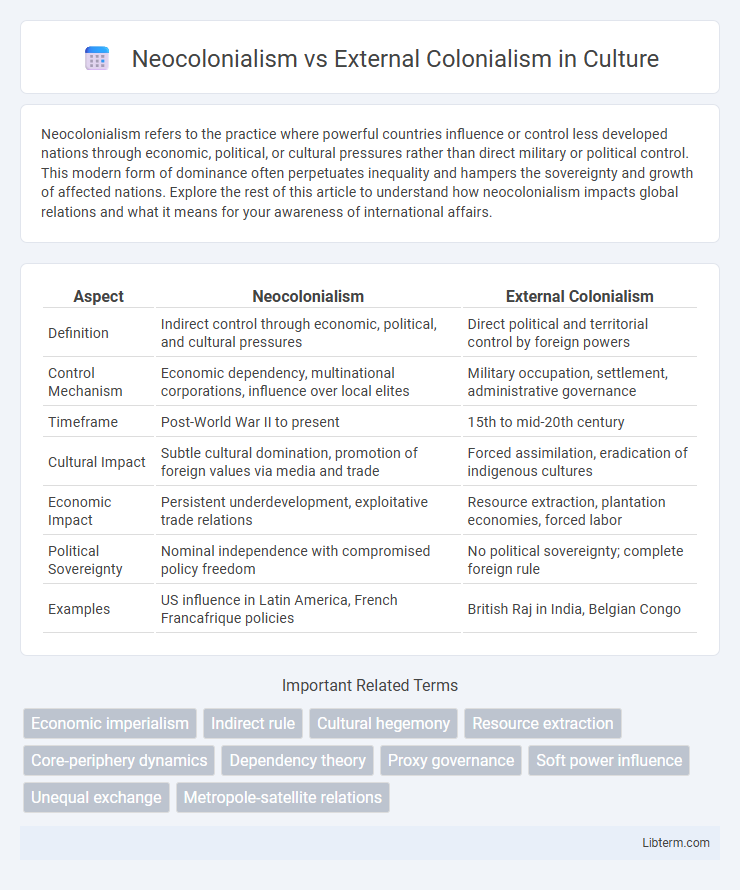Neocolonialism refers to the practice where powerful countries influence or control less developed nations through economic, political, or cultural pressures rather than direct military or political control. This modern form of dominance often perpetuates inequality and hampers the sovereignty and growth of affected nations. Explore the rest of this article to understand how neocolonialism impacts global relations and what it means for your awareness of international affairs.
Table of Comparison
| Aspect | Neocolonialism | External Colonialism |
|---|---|---|
| Definition | Indirect control through economic, political, and cultural pressures | Direct political and territorial control by foreign powers |
| Control Mechanism | Economic dependency, multinational corporations, influence over local elites | Military occupation, settlement, administrative governance |
| Timeframe | Post-World War II to present | 15th to mid-20th century |
| Cultural Impact | Subtle cultural domination, promotion of foreign values via media and trade | Forced assimilation, eradication of indigenous cultures |
| Economic Impact | Persistent underdevelopment, exploitative trade relations | Resource extraction, plantation economies, forced labor |
| Political Sovereignty | Nominal independence with compromised policy freedom | No political sovereignty; complete foreign rule |
| Examples | US influence in Latin America, French Francafrique policies | British Raj in India, Belgian Congo |
Introduction to Colonialism: Definitions and Key Concepts
Colonialism refers to the control or governing influence of a nation over a dependent country, territory, or people, typically involving settlement and exploitation. External colonialism involves direct political and economic domination by a foreign power through territorial conquest or colonization. Neocolonialism represents a subtler form of control where former colonial powers maintain influence through economic pressure, political manipulation, or cultural dominance without formal political control.
Understanding External Colonialism: Historical Overview
External colonialism refers to the direct political and military control imposed by European powers over foreign territories from the 15th to the 20th centuries, characterized by the establishment of settlements, resource extraction, and administration by the colonizers. Key examples include the British Empire in India, the French in Algeria, and the Belgian Congo, all marked by exploitation and cultural domination. This form of colonialism significantly disrupted indigenous societies and economies through enforced labor systems, land dispossession, and the imposition of foreign governance structures.
The Emergence of Neocolonialism in the Modern World
Neocolonialism emerged in the modern world as a subtle extension of control where former colonial powers and multinational corporations exert economic and political influence over newly independent states without direct governance. Unlike external colonialism, which involved overt territorial occupation and administration, neocolonialism manipulates global trade, investment, and aid to maintain dominance and exploit resources. This shift reflects changes in international power dynamics after decolonization, emphasizing indirect control mechanisms rather than formal sovereignty loss.
Key Differences Between Neocolonialism and External Colonialism
Neocolonialism differs from external colonialism primarily in its form of control, relying on economic, political, and cultural influence rather than direct territorial occupation. External colonialism involves tangible governance and physical presence, while neocolonialism operates through multinational corporations, international financial institutions, and subtle manipulation of local governments. The core distinction lies in the mechanisms of dominance--direct administration versus indirect control through economic dependency and political pressure.
Economic Impacts: Exploitation Then and Now
Neocolonialism and external colonialism both involve economic exploitation, but neocolonialism operates through indirect control such as multinational corporations and debt dependency rather than territorial occupation. Historically, external colonialism directly extracted resources and labor from colonies for the colonizing nation's benefit, leading to deindustrialization and underdevelopment. In contrast, neocolonialism maintains economic dominance by imposing structural adjustment programs and trade imbalances, perpetuating poverty and limiting sovereignty in formerly colonized countries.
Political Control: Direct Rule vs Indirect Influence
Neocolonialism exercises political control through indirect influence, often utilizing economic dependencies, multinational corporations, and political pressure to manipulate the domestic policies of sovereign nations without formal governance. External colonialism imposes direct rule, establishing foreign governments and administrative systems that explicitly control the political and social structures of colonized territories. The distinction lies in neocolonialism's subtle, covert mechanisms of control compared to the overt, institutionalized authority characteristic of external colonialism.
Cultural and Social Dimensions of Colonial Influence
Neocolonialism perpetuates cultural dominance through economic control, media influence, and ideological pressure that reshape indigenous identities while maintaining nominal political sovereignty. External colonialism imposes direct cultural assimilation by enforcing language, education systems, and social hierarchies that suppress native traditions and restructure social institutions. Both forms result in cultural dislocation and social fragmentation, but neocolonialism operates more subtly through global capitalism and soft power mechanisms.
Case Studies: Comparing Examples of Both Systems
Neocolonialism manifests in countries like Nigeria and India where former colonial powers maintain economic control through multinational corporations and debt dependency, contrasting with external colonialism in Algeria and Kenya, where direct political and military control defined colonial rule. The economic exploitation in neocolonialism relies on subtle mechanisms such as trade imbalances and foreign investment, while external colonialism involved overt territorial conquest and administration by European powers like France and Britain. Case studies reveal that neocolonialism perpetuates dependency without formal political domination, reshaping sovereignty through economic and cultural influence rather than direct governance.
Resistance and Responses to Colonial Practices
Resistance to neocolonialism often manifests through economic nationalism, grassroots activism, and cultural revival movements that challenge external economic control and political influence. In contrast, responses to external colonialism typically involved armed uprisings, anti-colonial wars, and organized nationalist movements demanding independence and the end of foreign military occupation. Both forms of resistance emphasize reclaiming sovereignty, protecting local resources, and asserting self-determination against exploitative colonial practices.
Conclusion: Ongoing Legacies and Future Perspectives
Neocolonialism perpetuates economic dependency and cultural influence without direct political control, contrasting with the territorial dominance characteristic of external colonialism. The ongoing legacies of neocolonialism include persistent inequality, resource exploitation, and limited sovereignty in formerly colonized nations. Future perspectives emphasize the need for genuine economic independence, restructuring global trade systems, and fostering autonomous development to overcome these enduring challenges.
Neocolonialism Infographic

 libterm.com
libterm.com